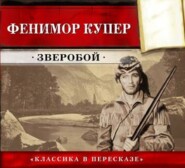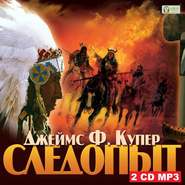По всем вопросам обращайтесь на: info@litportal.ru
(©) 2003-2024.
✖
The Spy: Condensed for use in schools
Настройки чтения
Размер шрифта
Высота строк
Поля
“Say one hundred and it is a bargain,” returned the man with a grin that he meant for a good-natured smile.
“A bargain!” echoed the peddler, in surprise; “I thought the bargain was already made.”
“Nothing is a bargain,” said the purchaser, with a chuckle, “until papers are delivered, and the money paid in hand.”
“You have the paper.”
“Aye, and will keep it, if you will excuse the money; come, say one hundred and fifty, and I won’t be hard; here – here is just the money.”
The peddler looked from the window, and saw with dismay that the evening was fast advancing, and knew well that he endangered his life by remaining in the dwelling after dark; yet he could not tolerate the idea of being defrauded in this manner, in a bargain that had already been fairly made; he hesitated.
“Well,” said the purchaser, rising, “mayhap you will find another man to trade with between this and morning; but, if you don’t, your title won’t be worth much afterwards.”
“I agree to the price,” he said; and, turning to the spinster, he placed a part of the money in her hand, as he continued, “had I other means to pay you, I would have lost all, rather than suffer myself to be defrauded of part.”
“You may lose all yet,” muttered the stranger, with a sneer, as he rose and left the building.
“Have you another house to go to?” inquired Katy.
“Providence will provide me with a home.”
“Yes,” said the housekeeper; “but maybe ’twill not be to your liking.”
“The poor must not be difficult.”[78 - hard to suit.] As the peddler spoke he dropped the article he was packing from his hand, and seated himself on a chest, with a look of vacant misery.
“It is painful to part with even you, good woman,” he continued; “but the hour has come, and I must go. What is left in the house is yours; to me it could be of no use, and it may serve to make you comfortable. Farewell – we may meet hereafter.”
“In the regions of darkness!” cried a voice that caused the peddler to sink on the chest from which he had risen, in despair.
“What! another pack, Mr. Birch, and so well stuffed so soon!”
“Have you not done evil enough?” cried the peddler, regaining his firmness, and springing on his feet with energy; “is it not enough to harass the last moments of a dying man – to impoverish me; what more would you have?”
“Your blood!” said the Skinner, with cool malignity.
“And for money,” cried Harvey, bitterly; “like the ancient Judas, you would grow rich with the price of blood!”
“Aye, and a fair price it is, my gentleman; fifty guineas; nearly the weight of that scarecrow carcass of yours in gold.”
A figure stood in the shadow of the door, as if afraid to be seen in the group of Skinners; but a blaze of light, aided by some articles thrown in the fire by his persecutors, showed the peddler the face of the purchaser of his little domain. Occasionally there was some whispering between this man and the Skinner nearest to him, that induced Harvey to suspect he had been the dupe of a contrivance in which that wretch had participated. It was, however, too late to repine; and he followed the party from the house with a firm and collected tread, as if marching to a triumph, and not to a gallows. In passing through the yard, the leader of the band fell over a billet of wood, and received a momentary hurt from the fall. Exasperated at the incident, the fellow sprang to his feet, filling the air with execrations.
“The curse of heaven light on the log!” he exclaimed; “the night is too dark for us to move in. Throw that brand of fire in yon pile of tow, to light up the scene.”
“Hold!” cried the speculator; “you’ll fire the house.”
“And see the farther,” said the other, hurling the brand in the midst of the combustibles. In an instant the building was in flames. “Come on; let us move towards the heights while we have light to pick our road.”
“Villain!” cried the exasperated purchaser, “is this your friendship – this my reward for kidnapping the peddler?”
“’Twould be wise to move more from the light, if you mean to entertain us with abuse, or we may see too well to miss our mark,” cried the leader of the gang. The next instant he was as good as his threat, but happily missed the terrified speculator and equally appalled spinster, who saw herself reduced from comparative wealth to poverty, by the blow.
Prudence dictated to the pair a speedy retreat; and the next morning the only remains of the dwelling of the peddler was the huge chimney.
CHAPTER XII.
HOTEL FLANAGAN AND ITS INTRUDERS
The position held by the corps of dragoons, we have already said, was a favorite place of halting with their commander.
A cluster of some half-dozen small and dilapidated[79 - falling into decay.] buildings formed what, from the circumstances of two roads intersecting each other at right angles, was called the Four Corners. As usual, one of the most imposing of these edifices had been termed, in the language of the day, “a house of entertainment for man and beast.” On a rough board, suspended from the gallows-looking post that had supported the ancient sign, was written in red chalk, “Elizabeth Flanagan, her hotel,” an ebullition[80 - outburst.] of the wit of some of the idle wags of the corps. The matron was the widow of a soldier who had been killed in the service, and who, like herself, was a native of a distant island, and had early tried his fortune in the colonies of North America. She constantly migrated with the troops, and it was seldom that they became stationary for two days at a time but the little cart of the bustling woman was seen driving into the encampment, loaded with some articles she conceived would make her presence welcome. With a celerity[81 - quickness.] that seemed almost supernatural, Betty took up her ground and commenced her occupation. Sometimes the cart itself was her shop; at others the soldiers made her a rude shelter of such materials as offered. But on the present occasion she seized on a vacant building and formed what she herself pronounced to be “most illigant lodgings.” The men were quartered in the adjacent barns, and the officers collected in the “Hotel Flanagan,” as they facetiously[82 - jocosely.] called headquarters. Betty was well known to every trooper in the corps, could call each by his Christian or nickname, as best suited her fancy; and although absolutely intolerable to all whom habit had not made familiar with her virtues, was a general favorite with these partisan warriors. Her faults were, a trifling love of liquor, excessive filthiness, a total disregard of all the decencies of language; her virtues, an unbounded love for her adopted country, perfect honesty when dealing on certain known principles with the soldiery, and a great good-nature. Added to these, Betty had the merit of being the inventor of that beverage which is so well known, at the present hour, to all the patriots who make a winter’s march between the commercial and the political capitals of this great State, and which is distinguished by the name of “cock-tail.” Such then was the mistress of the mansion, who, reckless of the cold northern blasts, showed her blooming face from the door of the building to welcome the arrival of her favorite, Captain Lawton, and his companion, her master in surgery.
Lawton and his companion now entered the building. A long table, made from boards torn from the side of an out-building, was stretched through the middle of the largest apartment, or the bar-room, and on it was a very scanty display of crockery ware. The steams of cookery arose from an adjoining kitchen, but the principal attraction was a demijohn of fair proportions, which had been ostentatiously placed on high by Betty as the object most worthy of notice.
Lawton soon learned that it was teeming with the real amber-colored juice of the grape, and had been sent from the Locusts, as an offering to Major Dunwoodie, from his friend Captain Wharton, of the royal army.
The group within were all young men and tried soldiers; in number they were about a dozen, and their manners and their conversation were a strange mixture of the bluntness of the partisan with the manners of gentlemen. Some were endeavoring to sleep on the benches which lined the walls, some were walking the apartments, and others were seated in earnest discussion on subjects connected with the business of their lives. All this time Dunwoodie sat by himself, gazing at the fire, and lost in reflections which none of his officers presumed to disturb.
A loud summons at the door of the building, and the dragoons instinctively caught up their arms to be prepared for the worst.
The door was opened and the Skinners entered, dragging the peddler, bending beneath the load of his pack.
“Which is Captain Lawton?” said the leader of the gang, gazing around him in some little astonishment.
“He waits your pleasure,” said the trooper, dryly.
“Then here I deliver to your hands a condemned traitor; this is Harvey Birch, the peddler spy.”
Lawton started as he looked his old acquaintance in the face, and turning to the Skinner with a lowering look, he asked:
“And who are you, sir, that speak so freely of your neighbors? But,” bowing to Dunwoodie, “your pardon, sir; here is the commanding officer; to him you will please address yourself.”
“No,” said the man, sullenly, “it is to you I deliver the peddler, and from you I claim my reward.”
“Are you Harvey Birch?” said Dunwoodie, advancing with an air of authority that instantly drove the Skinner to a corner of the room.
“I am,” said Birch, proudly.
“And a traitor to your country,” continued the major, with sternness; “do you not know that I should be justified in ordering your execution this night?”
“’Tis not the will of God to call a soul so hastily to his presence,” said the peddler, with solemnity.
“You speak truth,” said Dunwoodie; “but as your offence is most odious to a soldier, so it will be sure to meet with the soldier’s vengeance; you die to-morrow.”
“’Tis as God wills.”
“I have spent many a good hour to entrap the villain,” said the Skinner, advancing from his little corner; “and I hope you will give me a certificate that will entitle us to the reward; ’twas promised to be paid in gold.”
“Major Dunwoodie,” said the officer of the day, entering the room, “the patrols report a house to be burnt near yesterday’s battle-ground.”

















